Thoughts on the Mac OS X Mountain Lion Developer Preview
by Andrew Cunningham & Anand Lal Shimpi on February 19, 2012 7:40 PM EST- Posted in
- Mountain Lion
- Mac
- macOS
General Impressions: The iPad-ification of the Mac
With Mountain Lion Apple officially drops the Mac prefix to the OS, it's now simply OS X 10.8. It's interesting (and perhaps deliberate?) that Apple keeps speaking of the updates in Lion/Mountain Lion as bringing iPad features to the Mac, not just iOS features. Perhaps that speaks to the nature of the convergence we'll see going forward.
There was a time in the microprocessor business where AMD and Intel felt that the ideal architecture for low power was mutually exclusive with the ideal architecture for high performance. Over time it became very evident that what makes you power efficient often gives you great performance as well. What we saw was a unification of mobile and desktop CPU architectures as a result. Although you could argue that the same sort of product bifurcation is happening now with the popularity of smartphone SoCs, I suspect we'll eventually see more convergence there in terms of features over time.
I do wonder whether we'll see a similar transformation in the OS space. Much of the discussion has been focused around bringing iOS user experience and features to OS X, however I'm more curious about whether we'll see a more fundamental merging of the two OSes over time. Today Apple has an i and an X line of operating systems, but what's to say that we won't see an eventual unification there. In many ways this would be a motivation for OS X on ARM, but it's a similar (and possibly a stronger) motivation for iOS on x86.
For this developer preview, the download and installation processes are identical to Lion - you still get the OS from the Mac App Store, it still creates a recovery partition for diagnostic and reinstallation purposes, and it still looks and acts mostly the same. If you made a USB or DVD installer for Lion from the App Store installer, that method continues to work here.
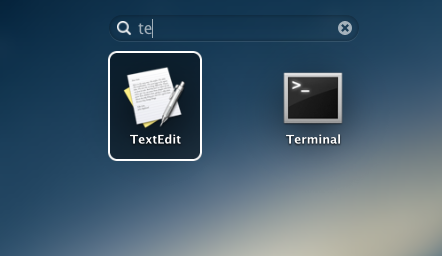
The Mountain Lion Finder, along with Lion additions like Launchpad and Mission Control, are at this point largely identical to their Lion counterparts. There are two obvious new features right now: first, Launchpad now includes a search box at the top of the window that lets you browse your installed apps. Compared to Spotlight, I find it to be of dubious usefulness, but I'm already on the record as finding the whole Launchpad concept to be of dubious usefulness - take my opinion as you will.
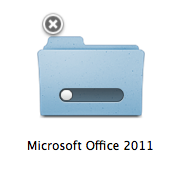
The other addition is also vaguely iOS-ish - you can cancel file copy operations in progress by clicking an X in the icon's upper left-hand corner (see above). Once a copy operation is complete, you delete the files by dragging them to the Trash just as before.
Safari 5.2
Safari 5.2, which is also currently available to developers as a beta for Lion, bumps the browser's WebKit version to 535.18.5, and brings with it some performance improvements and features. Features first: tabs now work as they do on the iPad, with each tab taking up an equal amount of space across the window - in Safari 5.1 and most other desktop browsers, new tabs are a fixed width (in both cases, the tabs begin to contract as you open more of them).
The address bar and search bar in the new Safari are also unified (as in Chrome and IE) - when you begin typing, the browser will search your default search engine, your bookmarks and history, and the content on the current page for matches. The Safari Reader button is now present to the right of the search/address bar at all times.
There's a new passwords manager in Safari that allows you to view and remove any stored user name/password combinations for websites you've visited. In the past this information was only accessible through the OS X Keychain but now it's available in both places.
Now, for performance - Safari 5.2 is measurably faster than Safari 5.1.3, and while it doesn't beat the latest stable versions of Firefox or Chrome in the tests below, the upgrade at least keeps Apple's default browser competitive. The problem is that this performance is a moving target - if Safari 5.2 doesn't launch before Mountain Lion's release this summer, both Mozilla and Google will have released several minor upgrades to their browsers that may help them pull even further ahead of Apple's latest. Interestingly enough the new Safari is actually faster than the latest stable build of Chrome in SunSpider but it loses everywhere else. Subjectively Safari feels fast but still not quite as fast as Chrome, although the two are much closer now.
These tests were run on a late 2010 MacBook Air, which runs a 1.6 GHz Core 2 Duo - please try to remember that before you laugh at any of these scores.
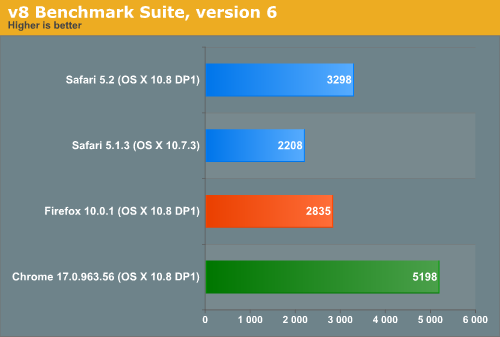
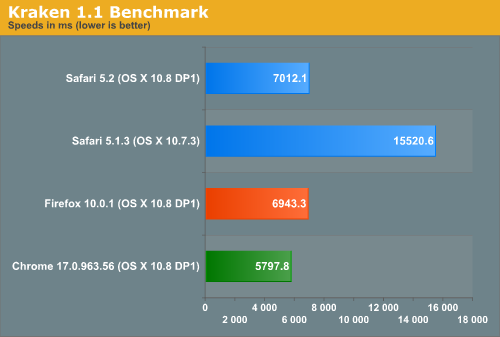
Apple Remote Desktop and Screen Sharing
The Apple Remote Desktop client in Mountain Lion has been updated to 3.6, which continues the years-long tradition of bumping the ARD version to support a new OS X release without adding enough fuctionality to justify a major version change. ARD gains IPv6 support and can now report information about batteries, trackpads, and Thunderbolt peripherals, but none of this fundamentally changes how the software works.
On a related note, Screen Sharing is made marginally more functional by the addition of controls at the top of the window - they don't really add anything that wasn't there, but they pull functionality that was previously hidden in menus and expose it to the user. Screen Sharing also supports drag-and-drop file sharing between connected computers, something previously limited to the full Apple Remote Desktop package.



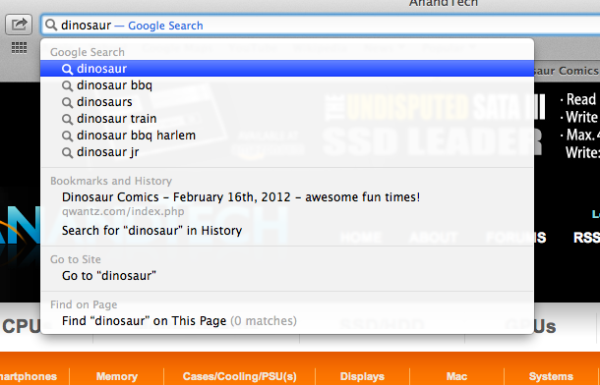
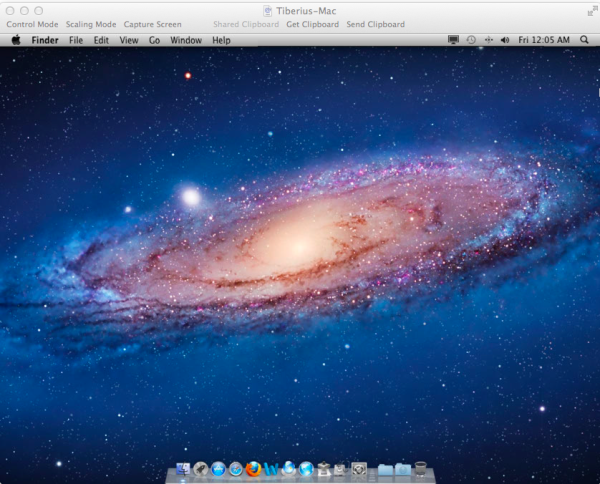








96 Comments
View All Comments
solipsism - Sunday, February 19, 2012 - link
AT has plenty of articles about Win8.• http://www.anandtech.com/tag/windows-8
Keep in mind that Win8 was leaked, in pieces over a long time so AT had to mostly write blog-length statements about many of the new features as they dropped, while Apple dropped an entire OS update at once with a detailed webpage and reviews by famous journalists and bloggers who got a one-one-one.
ananduser - Monday, February 20, 2012 - link
Anand is a mac user nowadays. Of course he tends to give more attention to mac wares and mac software. That doesn't mean he ignores other platforms or is less fair.solinear - Tuesday, February 21, 2012 - link
Honestly, I couldn't disagree more. There is a huge amount of attention paid to every Apple product here now, almost like it's a "zealot lite" website. I love how they focused on the amazing improvements in the browser, talking about how the tabs worked and scaled now... I'm sorry, but I haven't seen a browser where the tabs didn't scale automatically as you opened more in ages, but Apple is the 'standard' that they compare everything else to?As a result, I tend to find myself going to the hardware (SSD mostly) reviews and ignoring a lot of the others. I might be largely alone, but I see a very heavy amount of coverage to the Apple products, particularly for their market share. If he's going to review Apple stuff all the time, maybe he should be reviewing various Linux distro GUI changes and so forth, if he wants to be fair. I can only remember one of those and it was a LONG time ago.
repoman27 - Wednesday, February 22, 2012 - link
If you're not interested in reading articles about Apple products, simply ignore them. If you want AnandTech to focus more on topics of interest to you, just ask, they seem pretty receptive to input.If Apple articles get a significant number of page views and generate decent revenue for the site, why should AnandTech stop posting them? Just because you're not interested in this type of content doesn't mean that other readers aren't. (Apple now has greater than 10% of US marketshare, and their customer base tends to be of a demographic group that is quite desirable to advertisers.)
KPOM - Monday, February 20, 2012 - link
I doubt it. If anything, iOS 6 would be more of the response to Windows 8 than Mountain Lion. The Mac is an important part of Apple, but it represents only 25% of its revenue. iOS represents about 50% of its revenue and about 70% of its profits.Apple always has had a faster release cycle for OS X than Microsoft had for Windows. Plus, they have for quite a while dropped support for older Macs and/or software with each new release. Leopard dropped the Classic mode. Snow Leopard dropped PowerPC. Lion dropped Rosetta and 32-bit Macs. Apple, unlike Microsoft, makes its money on hardware rather than software, and thus does not have an incentive to keep its new operating systems running on ancient hardware the way Microsoft does.
MonkeyPaw - Sunday, February 19, 2012 - link
"The last thing I wanted to talk about is something we've already touched on, but it bears repeating - Mountain Lion is dropping support for any Mac that is not capable of booting OS X's 32-bit kernel."Am I understanding that right, or should that read "64-bit kernel"?
jedivulcan - Sunday, February 19, 2012 - link
From what I've been reading and seeing elsewhere on the internet, AirPlay Mirroring does using the latest iOS 5 beta for Apple TV and a Sandy Bridge based Mac.solipsism - Sunday, February 19, 2012 - link
I'm not a fan of LaunchPad but it's perfect for those that aren't heavy or proficient computer users. It makes finding and executing an app simple while bringing a familiarity seen on iOS-based iDevices which far outnumber Macs.PS: Dashboard also gets the Launchpad-like displaying of widgets and it's much better than their previous model of having a single row at the bottom that scrolls off screen.
ltcommanderdata - Sunday, February 19, 2012 - link
Any word on new OpenCL (1.2) or OpenGL (4.x) support?With no QuickSync instead relying on CPUs, hopefully they at least are implementing extensive SSE4.x and AVX acceleration.
ananduser - Monday, February 20, 2012 - link
Apple is not really famous for up to date graphical driver support. And in a way I tend to side with them. The most recent OpenGL implementations are only needed for games and not for CAD.